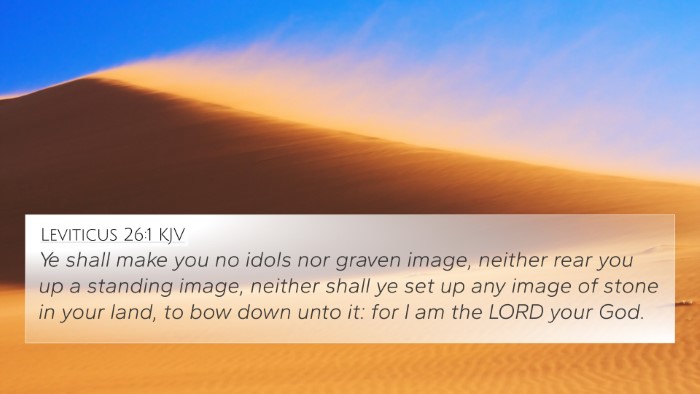2 Kings 17:12 states: "And they served idols, whereof the LORD had said unto them, Ye shall not do this thing." This verse depicts the disobedience of the Israelites in worshiping idols, which is a recurring theme throughout the Bible. To better understand this passage, we can analyze its implications and connections with various biblical texts.
Meaning and Context
The context of 2 Kings 17 involves the fall of Israel to Assyria, primarily due to idolatry and turning away from the commandments of God. Matthew Henry explains that this verse highlights the folly of serving idols in opposition to God's commandments. The people of Israel had been warned repeatedly against idolatry, yet they chose to engage in practices explicitly condemned by the Lord.
Adam Clarke adds that the reference to idols signifies the spiritual blindness of the people, demonstrating their rebellion against God. This act of serving idols is significant as it shows a direct violation of the covenant between God and His people.
Albert Barnes comments that this verse serves as a powerful reminder of the consequences of disobedience to God. The Israelites' actions resulted in severe repercussions, ultimately leading to their exile. This passage serves as a historical account, as well as a moral lesson about fidelity to God's laws.
Connections between Bible Verses
To illuminate the meaning of 2 Kings 17:12, we can explore several other scriptures that resonate with its themes of idolatry and divine disobedience:
- Exodus 20:4-5: "Thou shalt not make unto thee any graven image..." This foundational commandment explicitly prohibits the creation and worship of idols.
- Leviticus 26:1: "Ye shall make you no idols nor graven image..." Here, God reiterates His expectation for His people to remain faithful to Him alone.
- Isaiah 44:9-10: "They that make a graven image are all of them vanity..." This passage emphasizes the futility of idol worship and its inability to save.
- Jeremiah 2:27: "Saying to a stock, Thou art my father; and to a stone, Thou hast brought me forth..." This verse critiques the absurdity of turning to inanimate objects for guidance and identity.
- Acts 17:29: "Forasmuch then as we are the offspring of God, we ought not to think that the Godhead is like unto gold, or silver, or stone..." The New Testament reinforces the idea that God cannot be equated with physical objects.
- 1 John 5:21: "Little children, keep yourselves from idols." This New Testament exhortation reflects the ongoing challenge to avoid idolatry.
- Romans 1:25: "Who changed the truth of God into a lie, and worshipped and served the creature more than the Creator..." This demonstrates that idol worship is a rejection of the Creator God.
Thematic Bible Verse Connections
The theme of idolatry is prevalent throughout Scripture, inviting believers to examine their hearts for any forms of modern idolatry. These passages collectively emphasize the importance of worshiping God in spirit and in truth, rather than resorting to substitutes that lead to spiritual decay.
Cross-Referencing Biblical Texts
In exploring cross-references, we identify connections not only within the Old Testament but also significant links to New Testament teachings:
- Hebrews 9:1: The regulations of the first covenant showcase God's desire for purity in worship.
- Matthew 6:24: "No man can serve two masters…" articulates the impossibility of divided loyalties in faith.
- James 4:4: "Ye adulterers and adulteresses, know ye not that the friendship of the world is enmity with God?" This highlights the constant struggle against idolatry in the hearts of believers.
Inter-Biblical Dialogue
The dialogue between the Old Testament references and the New Testament applications fosters a comprehensive understanding of God's unchanging nature and His standards for worship. Cross-referencing these verses reveals patterns of disobedience that confront contemporary readers, calling into question the idols in their own lives.
Conclusion
In summary, 2 Kings 17:12 serves as a stark warning against idolatry and emphasizes the importance of fidelity to God's commandments. By utilizing cross-referencing tools, readers can explore the rich interconnections within Scripture, gaining deeper insights into the nature of worship and the consequences of turning away from God's truth.
For those seeking tools for Bible cross-referencing, a Bible concordance or a dedicated cross-reference Bible study guide can enhance understanding. By identifying biblical motifs and connections, believers can cultivate a more profound engagement with the Word of God and a greater sensitivity to the themes woven throughout His Scriptures.









